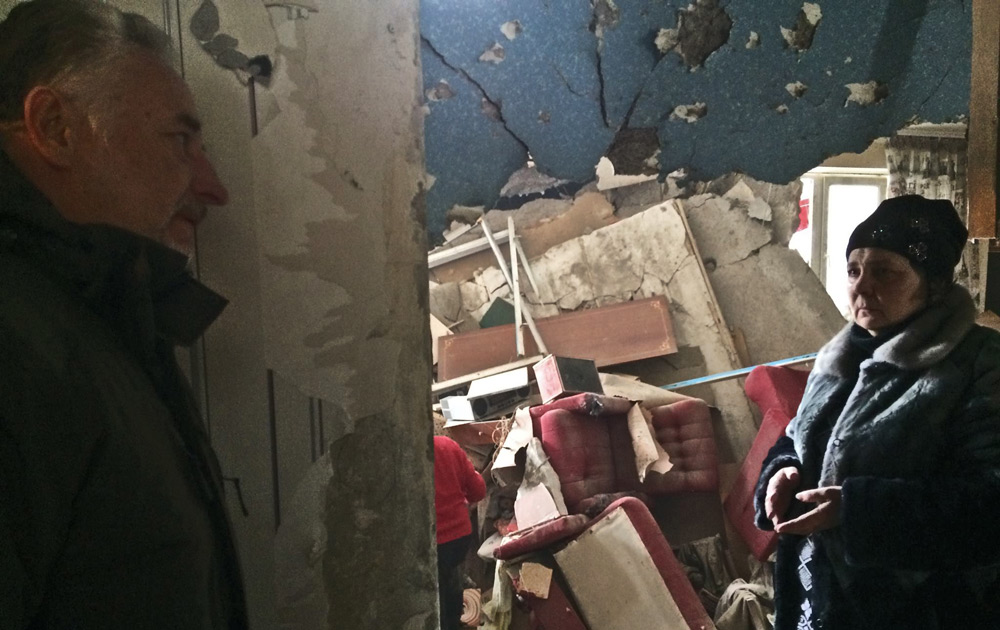Vladyslav Horbovets (vascular surgeon):
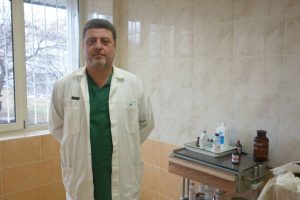
Military medicine has always been at a high level in Ukraine. In the USSR, it was basically practiced in military district hospitals. But how did these military hospitals function? They mostly treated banal injuries, but rarely serious trauma. For the most part, they treated war veterans and military pensioners. When I worked with an emergency ambulance unit, many military doctors visited us to learn about different trauma – gunshot wounds, falls from high-storey buildings, industrial injuries, injuries sustained in road accidents, etc. – all of which differ very little from combat wounds, injuries sustained from mines and explosives, etc. At that time, civilian doctors had more experience than military medics.
We also had all the required equipment – from tourniquets to vascular prosthetics, anticoagulants, and antibiotics. And, we were well organized! We started with the Battle of Debaltseve; there were very many casualties then, and it was hard to get them out of the zone and into hospital. They were taken out by trucks. As far as I can remember, as many as 178 wounded were admitted in one day! 178! The evacuation was very well organized from the front lines to Bakhmut. It took just minutes, from the moment a wounded soldier arrived to the start of the surgical process… just minutes! It was like something out of an American TV series, believe me!
I remember that the surgical team was immediately summoned to the hospital operating room. We entered the room, and there were three or four wounded men lying on the operating tables. Most of them had severe limb injuries because these parts of the body are the most exposed in combat; the other parts are more or less protected by the soldier’s bulletproof vest. There were combined traumas with bone damage and injuries to soft tissues. Most vessels needed to be restored because if that’s neglected, the leg will have to be amputated. Well, of course, we all worked together – anesthesiologists, surgeons, and traumatologists. It was and always has been a matter of team work, a group effort!
Oleksandr Danyliuk (former military doctor, surgeon):

During the first months of the war, the men along the entire front line were drawn into active combat – the lines stretched from the Sea of Azov, from the middle of Luhansk Oblast to the border. There just weren’t enough military doctors to cover the entire line of defense.
We were surrounded, and on the ninth day I realized that I couldn’t stop the bleeding from the man’s liver unless I operated. When we opened the abdomen, we saw that there were almost two liters of blood in the abdominal cavity. There were also injuries to the gastrointestinal tract – and this blood was not sterile. I couldn’t do a classic reperfusion, so I picked up an ordinary plastic cup from which we drank tea and water, and used this glass to empty the abdominal cavity. The blood was then transferred into a medicine bottle, anticoagulant drugs were added and the blood was infused back into the vein. The patient survived. The operation lasted four hours, but the patient was under and unconscious for only one hour. The rest of the time we administered painkillers, but he was fully conscious. After the operation, his first words were: “I heard and felt everything.”
Casualty selection was the most difficult….Those moments leave scars on your soul for the rest of your life. In a war, you have to choose who can be saved. All the others must wait for death. Patience… patience… we must be patient and live through this most difficult period. The decisive battle is still ahead. We must arm ourselves with patience and restraint so that at the crucial moment we will win and liberate our country.
Volodymyr Stefaniv (dentist):
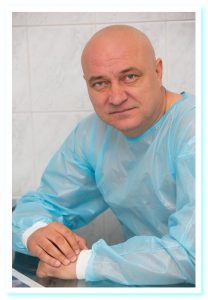
We worked on guys who’d gone through Ilovaisk and Debaltseve; we treated our Cyborgs, who defended Donetsk Airport – all of them were fearless in combat. They would arrive, sit down and, like children, turn pale, start sweating and sometimes even lose consciousness. We installed dental implants, and that’s very, very expensive, believe me! It made no difference whether the patient was actually fighting our enemy or whether he’d just been released.
We work free of charge. I believe that every Ukrainian medic should visit the war zone at least once… Yes, there’s a shortage of doctors. But, let me tell you that if a doctor works in the war zone once, there’s a 99.9 percent chance that he/she will go back. The atmosphere is so uplifting and the people are kinder, more generous and more aware.
Oleksandr Linchevsky (Deputy Minister of Health):
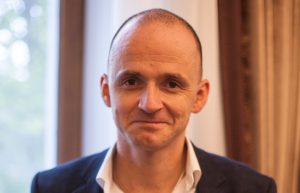
There’s an ongoing war on our territory. It’s a war in regions with specific cities and villages, specific hospitals and specific civilian doctors. In 2014 and 2015, there were no manuals instructing us how to properly fight in our own country, how to use medical units, civilian organizations, and particularly, volunteers in the best possible way. Soviet-style medicine was not oriented towards treating the wounded. We’re gradually changing our attitude to soldiers. We no longer try to cut down on expenses because we know that each soldier is a person, a citizen of our country, like all of us. And, he is the best of us!
Our soldiers should know this. They should have the best first-aid kits, the best uniforms and the best weapons. 90 percent of the men KIA die before seeing a doctor. 90 percent of our resources should be focused on pre-medical aid and working with medical personnel. If a wounded soldier has survived before meeting with the surgeon, then he must live.
Artem Pokhyl (dentist):
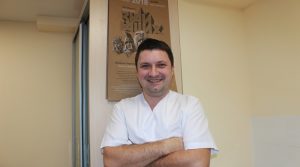
The first wounded soldiers arrived in Dnipro after the Battle of Ilovaisk. I saw a mummy-like figure, sporting a blood-soaked bandage over his face, walk into my office. He had a very bad toothache… and that’s how I got caught up in the war.
It’s the duty of field doctors to list all the guys requiring dental care and deliver them to the clinic. Our project focuses more on prevention than on treating emergency cases, although we are fully prepared for everything. Most importantly, we have never encountered any really bad persons… No one with bad intentions or an evil heart will be able to survive 24 hours in the war zone.
When things start exploding all around you, the mask drops… and the real you appears. Either you grab your suitcase, and run out in your underwear – and you’ll disappear forever, or you continue working calmly and finish up a root canal under fire or shelling. That’s all! The most important things happen when you return from the front because you’ve become a very good psychologist. Now, you can clearly distinguish between truth and lies, a good person and a bad one… because everything is more real there.
Nataliya Babiychuk (dentist):
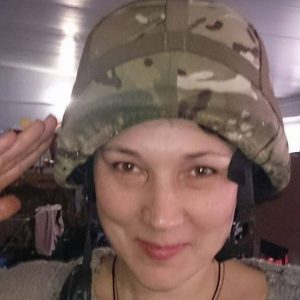
We (female medics-Ed.) got along really well with the men. We’ve remained friends; they would give us their chevrons and small trinkets – somehow trying to please their doctors. We appreciated all their gestures. There aren’t many of us, and we also get tired and can’t work properly.
But, I remember all the men that I met over there. When a guy comes in, you see his hands, his injuries; sometimes they’re dirty and burnt. I remember such painful moments. But, I also remember their happy smiles when they get out of the dental chair and when you give them a small token gift – a chocolate, some toothbrushes – well, they become like children who’ve been rewarded and you have personally played a role in their lives. They know and feel that they are needed, and that they are taken care of.
Olha Bohomolets (Head of the Verkhovna Rada Committee on Healthcare):
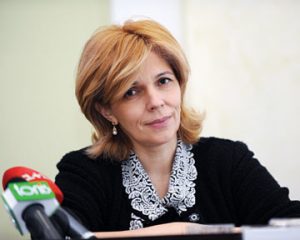
Our first task was to provide the men with first aid kits. Our second task was to teach them first aid survival skills. We managed to change the training programme at the very beginning, and every officer deployed to the front lines followed a week-long survival course. They also went through psychological training: how to keep calm, how to manage their men. When I travelled to the combat zone, I would stop at checkpoints, show them my ID, and say: “Show me your touniquets and how to use them. You there, put it over the thigh, and you on your arm, and you on the neck.” That’s how I checked up on them.
The volunteers who were on the Maidan went to war because they understood that no one else would go in their place. When mass mobilization was announced, the recruiting stations didn’t have time to inspect the men. I remember working on a case where 300 men were mobilized and we didn’t even have time to identify their blood group. There were also men who hadn’t been X-rayed, and many had been exposed to tuberculosis. There were problems everywhere, and we had to deal with them, learn how to solve them.
Of course, our doctors had to perform operations that they’d never done before… cases where there were no muscles, bones, flesh, or pieces left… and you must come up with something, you need to do something now. Our doctors are great! We’re encouraging them to publish an atlas dedicated to military field therapy and surgery, which will show visually what has been done and how many lives they’ve saved. We have all the photos and materials we need.

Here’s a living example – Vadym Sviridenko. I took part in his evacuation from the occupied “DNR” zone. He was a paramedic and was seriously injured; all his comrades were killed. He survived and didn’t freeze to death because he lay under a bunch of bodies for three days. When he understood that he would die, he tried to get out of that hole, and was captured. He’d been shot in the abdomen and all his limbs were frozen. We got him back. He developed gangrene, and his four limbs were amputated. Well, today he’s a champion. The president has authorized Vadym to work with our veterans. Vadym’s a shining example of how you can survive a situation and live to help others. Vadym’s children were born after the events I’ve just described.
Hennadiy Druzenko (President of the Pyrohov First Volunteer Mobile Hospital)
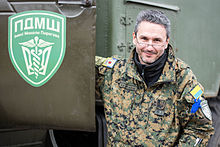
Our country survived thanks to the volunteer movement only because the truth about the terrible lesson of the 20th century is probably ingrained in our genes, at the subconscious level.
I think that we’re fighting not only for our language, flag and traditions, but also for a more humane attitude towards people, for something absolutely opposite to the Soviet concept of using men as “cannon fodder”. In fact, we mobilized the best medics without offering them a single penny, a single incentive. They went to help our men, treat them, and show them that we cared. Today, the Mykola Pyrohov First Volunteer Mobile Hospital represents a medical reform that has succeeded and its effectiveness has been tested and confirmed… even though our government didn’t notice it then and still fails to notice it. There are districts where we work and others where we don’t, where our doctors, frankly speaking, aren’t welcome due to local corruption as we show that it’s possible to provide better services and not take money for them.
War opens the door to new possibilities. If you don’t take certain risks, the soldier might die. We’re faced with injuries that you seldom see in civilian life. Our doctors have performed miracles… Today, we have a fairly young doctor from Uzhhorod, Oleksandr Danyliuk, working at the Ministry of Health. He’s never worked for us, but he performed operations in the trenches, working with a flashlight, something that has captured the imagination of our most experienced surgeons.
Vladyslav Horbovets has worked with our mobile hospital. He’s travelled from Stanytsia Luhanska to Mariupol with his unique instrument for vascular welding. There’s another doctor, a therapist from Ivano-Frankivsk – Halyna Chernysh. When she first came to Stanytsia Luhanska, she wrote all the prescriptions, reports and recommendations in Ukrainian. But, the local nurse returned all the papers with a note written in bold red ink: “I don’t understand a word!” And guess what? Halyna’s openness, the light and love in her eyes reversed this situation.







